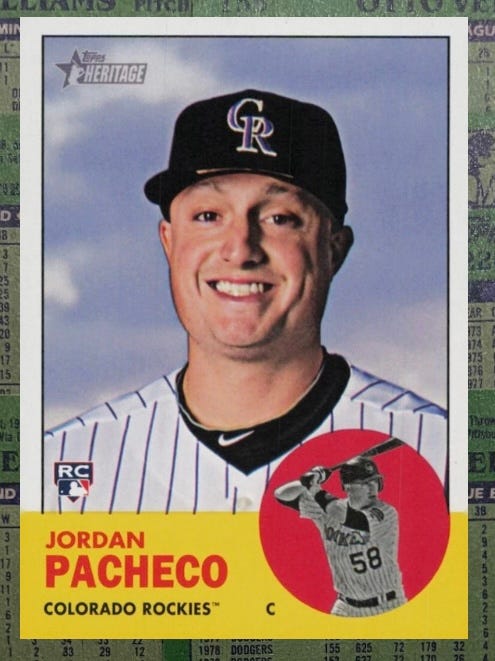Mile High Return
Drafted and developed by the Rockies, Jordan Pacheco arrives at his biggest challenge yet
The move from the mountains to the desert was not by design.
Drafted by Colorado in 2007 and promoted to the big leagues with the Rockies four years later, Jordan Pacheco found himself designated for assignment a couple months into the 2014 season. For eight days, Pacheco hung adrift in baseball’s bardo, unsure if another club would seek his services at the Major League level or if his 40-man roster status would disappear — the terms of an outright assignment to Triple-A Colorado Springs.
The Diamondbacks, sputtering and in search of the slightest spark, claimed him off waivers. On June 13, Pacheco — wearing ARIZONA across his chest — entered the game as a pinch hitter in Dodger Stadium. Any comfort from remaining within the NL West likely disappeared as soon as he saw Clayton Kershaw standing 60-feet, six-inches away.
In the D-backs dugout, however, was hitting coach and longtime big league pinch-hitter Turner Ward. Deployed often in that capacity, Pacheco could now rely upon the wisdom of a man who extended his career with the ability to deliver a big hit off the bench.
Last week, Pacheco was named one of two interim hitting coaches of the Rockies, promoted from Colorado Springs where he served for more than three years as the Triple-A hitting coach. Ward, who has served as a mentor and sounding board for his former pupil during Pacheco’s coaching career, can relate as well as anyone to what the new role requires.
“I had a conversation recently,” says Ward, who was a hitting coach for the D-backs, Dodgers, Reds, and Cardinals over the past decade. “A player called me, and... he just needed encouragement. When it boils down to it, sometimes that’s all you need.”
When Pacheco joined the D-backs in 2014, he entered an unraveling Diamondbacks clubhouse with poise. He was friendly but not loud. He was respectful and polite but not timid. Pacheco’s confidence and leadership was immediately evident. He had the kind of presence every team wants in its clubhouse.
Ward texted Pacheco shortly after the recent coaching changes in Colorado. Pacheco replied that he’d call Ward once he got caught up.
Ward laughed when relaying that story. His reply to Pacheco: “Just remember you never get caught up in that position.”
Pacheco and fellow interim hitting coach Nic Wilson inherit a massive challenge. The Rockies were 7-33 when they were added to the Major League staff; the team is now 8-40 after last night’s loss to the Phillies. To no one’s surprise, the offensive hasn’t looked any different overall.
Pacheco may find an advantage with age and his relative lack of distance from the batter’s box. He’s 39 years old and took his final MLB at-bat nine years ago as a member of the Reds. (Cincinnati was playing in Coors Field, of course, because the baseball gods have a sense of humor.) He played minor league ball through 2019 and scratched the itch one final time in the independent leagues in 2021.
Ward mentions how the influx of data and nuanced video analysis have added so much more to the Major League hitting coach’s job. But he remains faithful to the other aspects to the position.
“You know, these pitchers in the big leagues are really good,” Ward says, well aware he’s stating the obvious. “There’s no soft landings anywhere. So when you’re in a bad place, it just becomes really bad. And so sometimes [the coach] just needs to be, you know, a voice of reason or voice of confidence.” Ward advised Pacheco from the beginning of his time as a hitting coach that he was “going to be a more of a psychologist” than a technician or analyst of mechanics.
Most importantly, though, Ward emphasizes that Pacheco understands how hard it is to hit big league pitching: “That's a key contributor to being [successful] in the dugout and those cages — never forgetting how hard it is.”
“What he’s so good at and what’s just so natural to him is going to be his greatest strength: It’s the relationships that he’s able to build. You knew this back then,” Ward shares, confirming impressions from my limited interactions with him during the 2014 season. “Everybody loved Jordan… The calmness that he can bring is what is going to help him, and, of course, help the others around him. For me, that’s all I wanted to be — that voice of reason when things are going south.”
I remember everyone in the Diamondbacks baseball operations department seemed to root a little harder for Pacheco. Of course, we wanted everyone to succeed. His personality and quiet confidence, though, made him easier to like.
Ward offers high praise for Pacheco, comparing him to Cliff Pennington and Paul Goldschmidt when it comes to demeanor and work ethic.
“You just want to see [those types of players] do well, and, as a coach, you just want to work extremely hard for them to help them get through whatever they’re going through, or get to where they want to go. And because they understand the struggle and know how to bring the right attitude on a daily basis, those guys are really good coaches.”
Let’s be sure to temper our expectations. The Rockies’ struggles are not about coaching at the big league level; there’s a talent deficit across the roster that not even the greatest coaches could overcome.
The mountains have turned blue and it’s time to start drinking.
Keep reading with a 7-day free trial
Subscribe to Warning Track Power to keep reading this post and get 7 days of free access to the full post archives.


